French
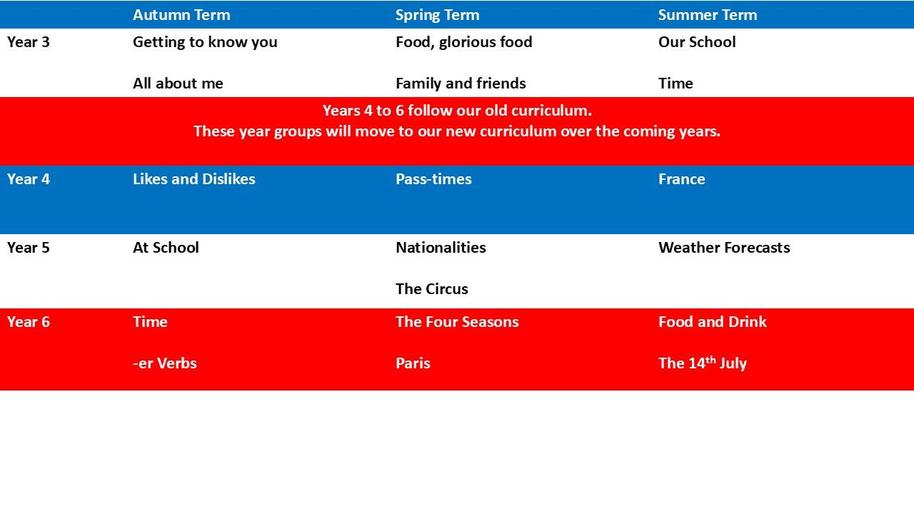
The Year 3 cohort have not been taught French before. A new curriculum has been planned for them.
The Year 4, 5 and 6 cohorts have been taught French since Year 1 - they are still being taught our old curriculum. We gradually introduce and publish our new curriculum over the next four years following this schedule.
- 2025 - 2026 Year 3
- 2026 - 2027 Year 4
- 2027 - 2028 Year 5
- 2028 - 2029 Year 6
Curriculum by Year Group
Year 1
Autumn Term
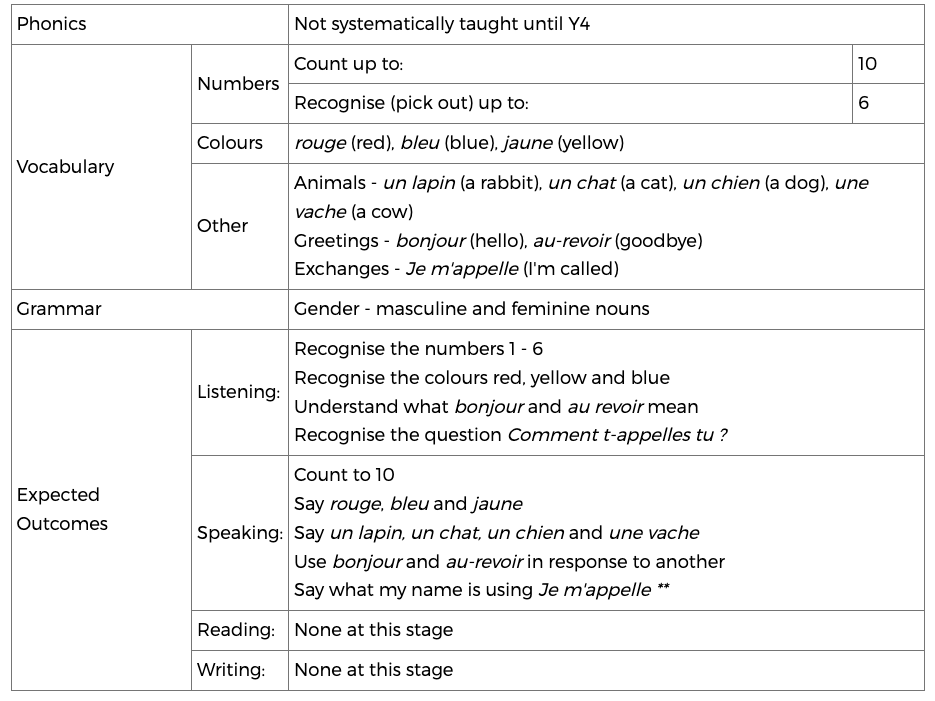
Spring Term
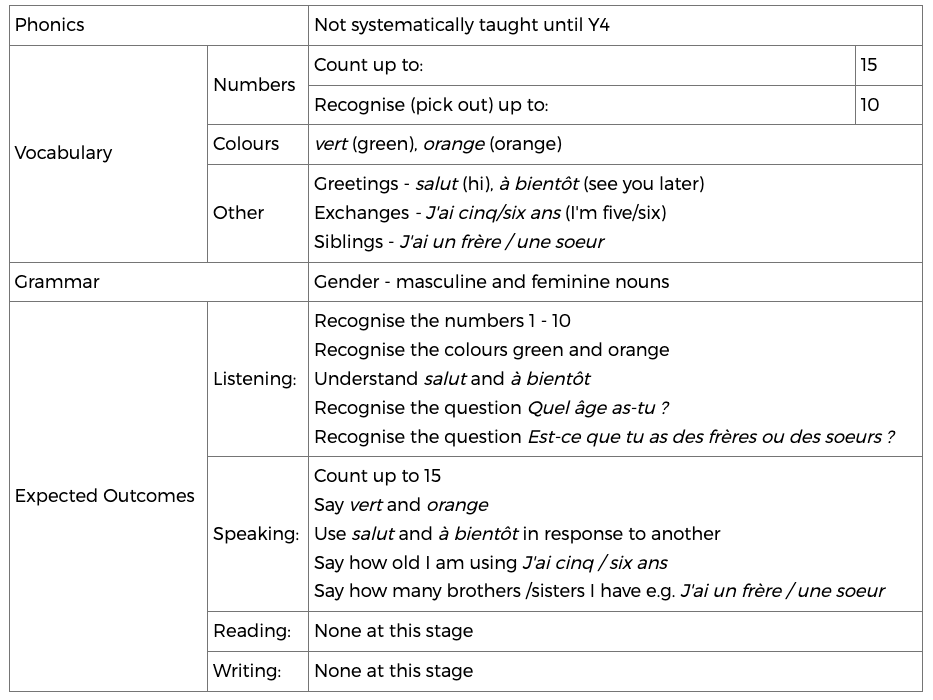
Summer Term
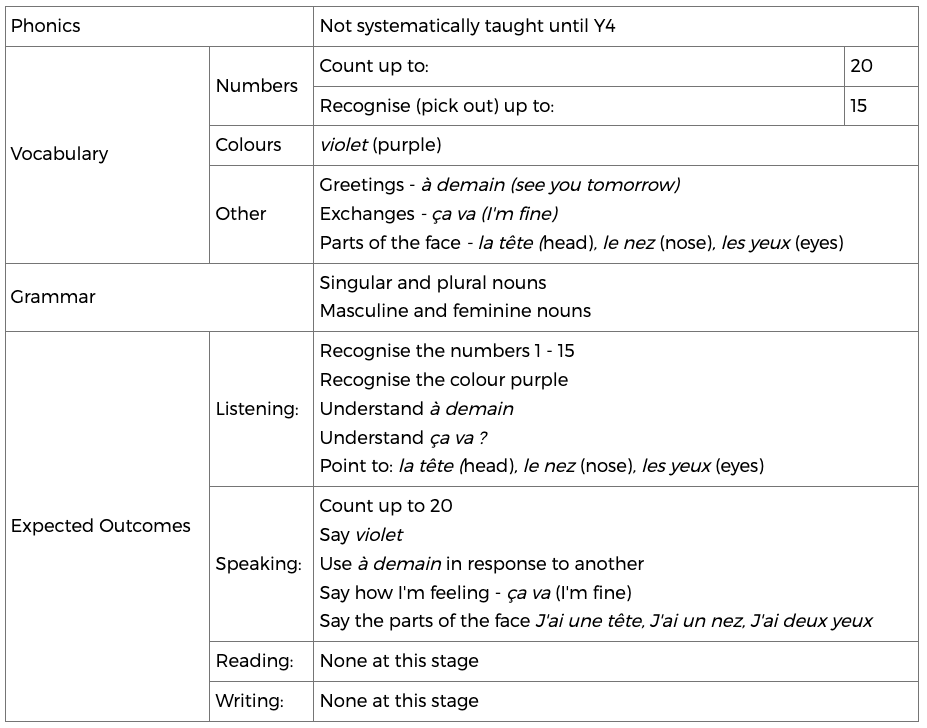
Year 2
Autumn Term
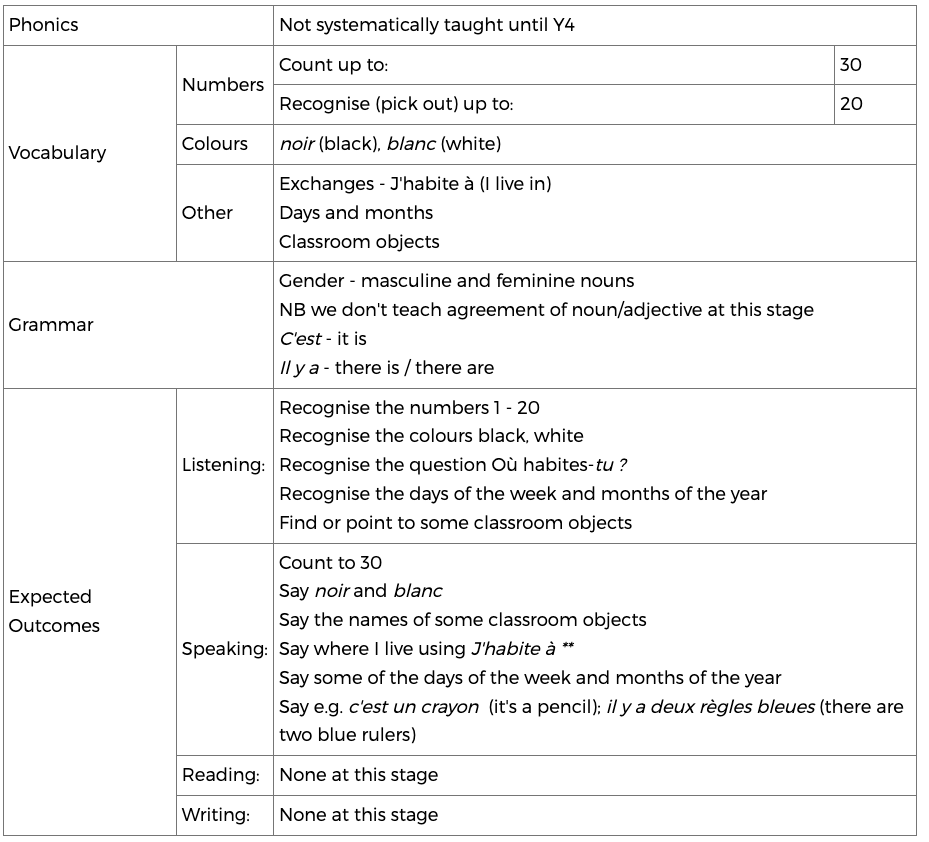
Spring Term
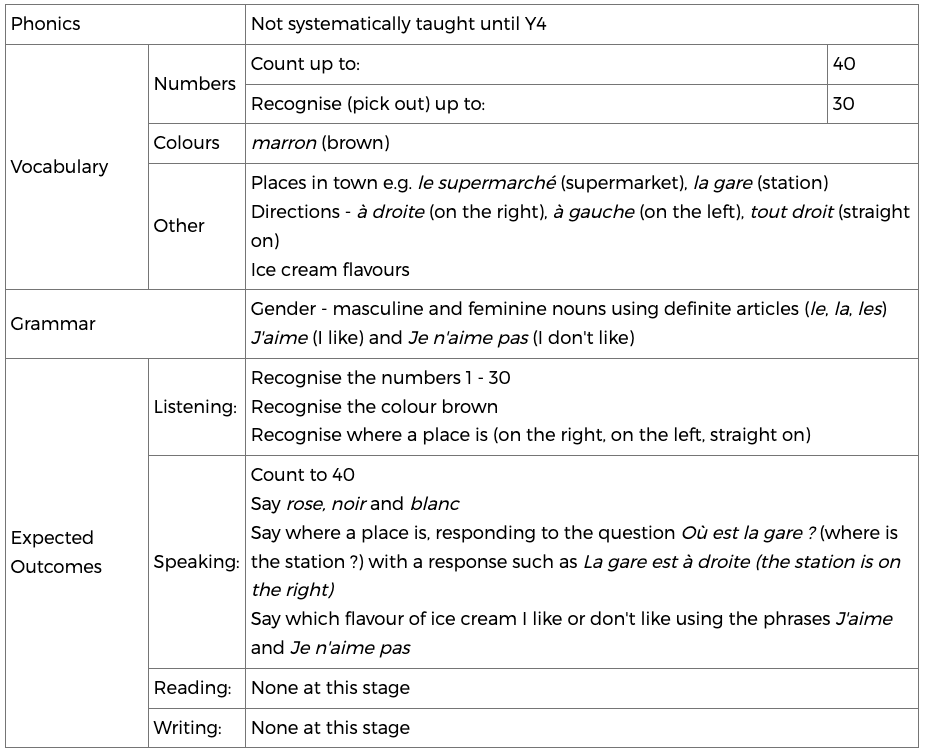
Summer Term
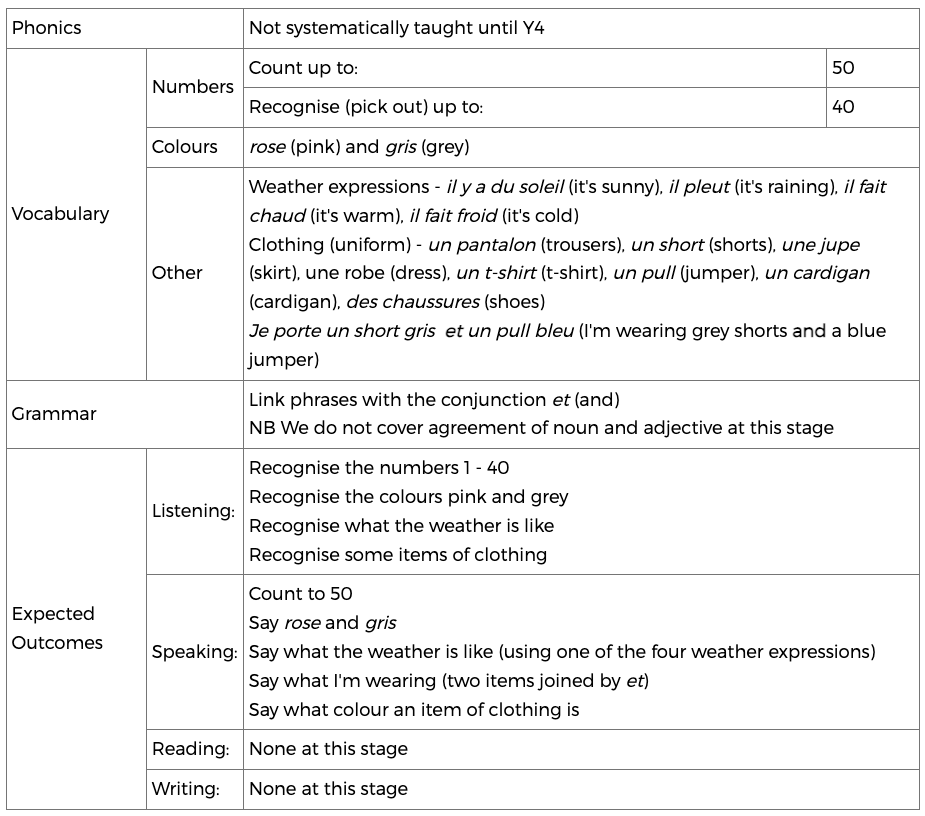
Year 3
Autumn Term 1 - Getting to Know You
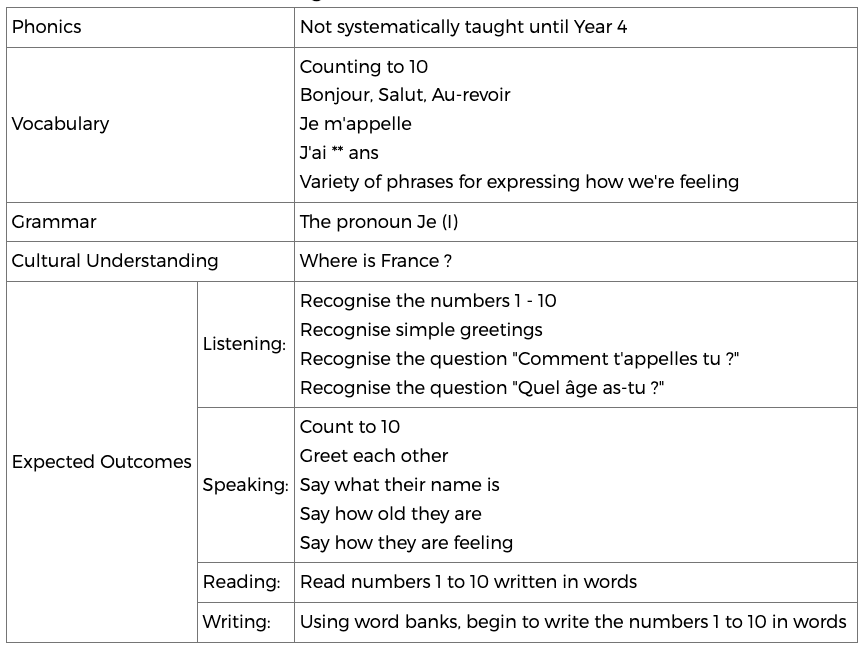
Autumn Term - All about me
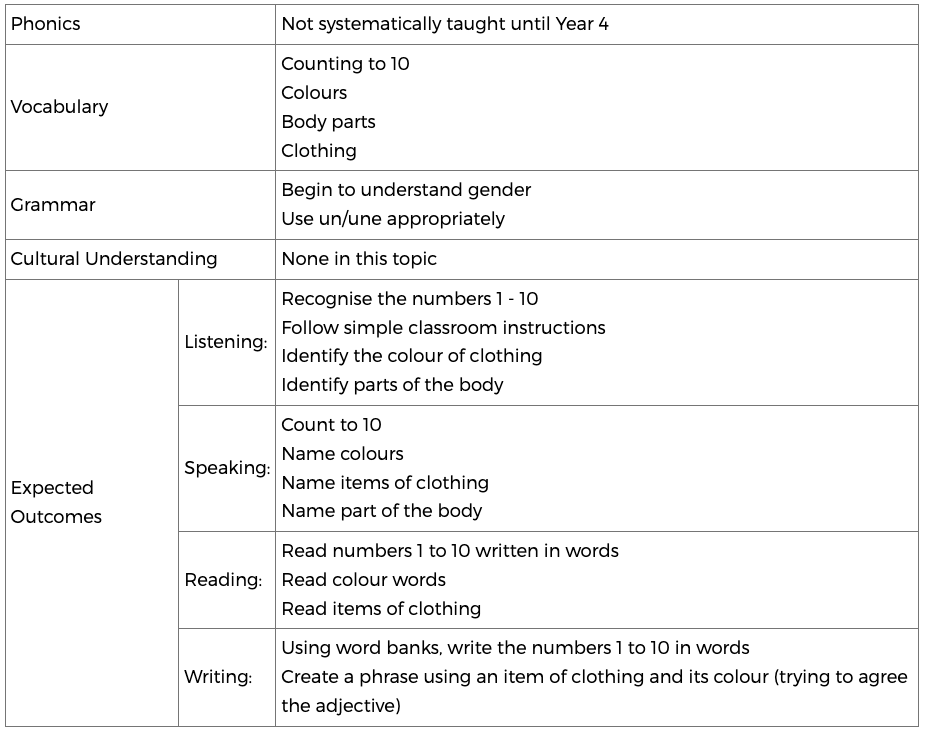
Spring Term 1 - Food, glorious, food !
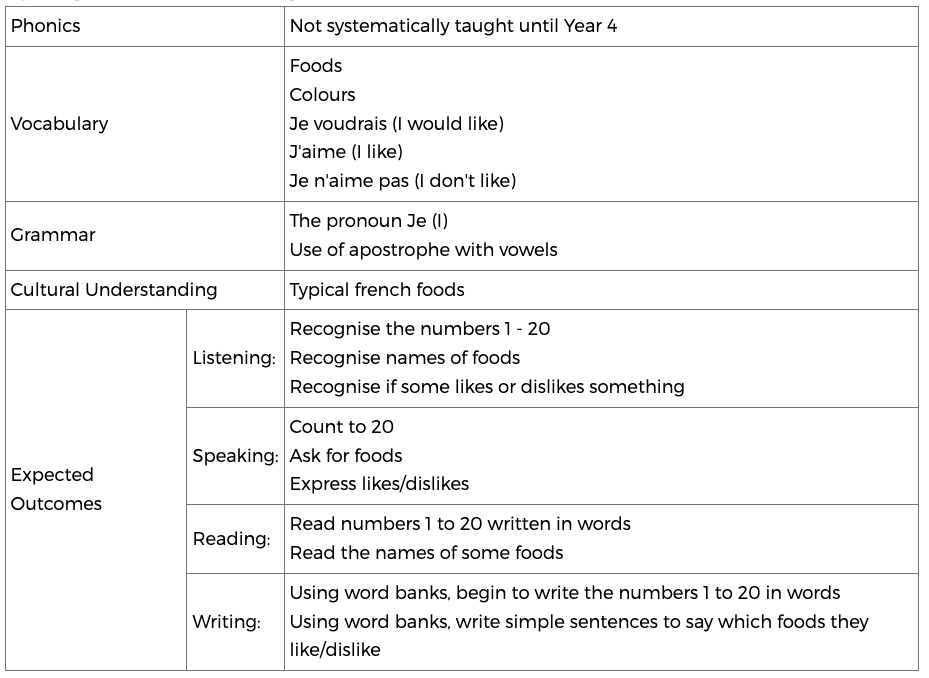
Spring Term 2 - Family and Friends
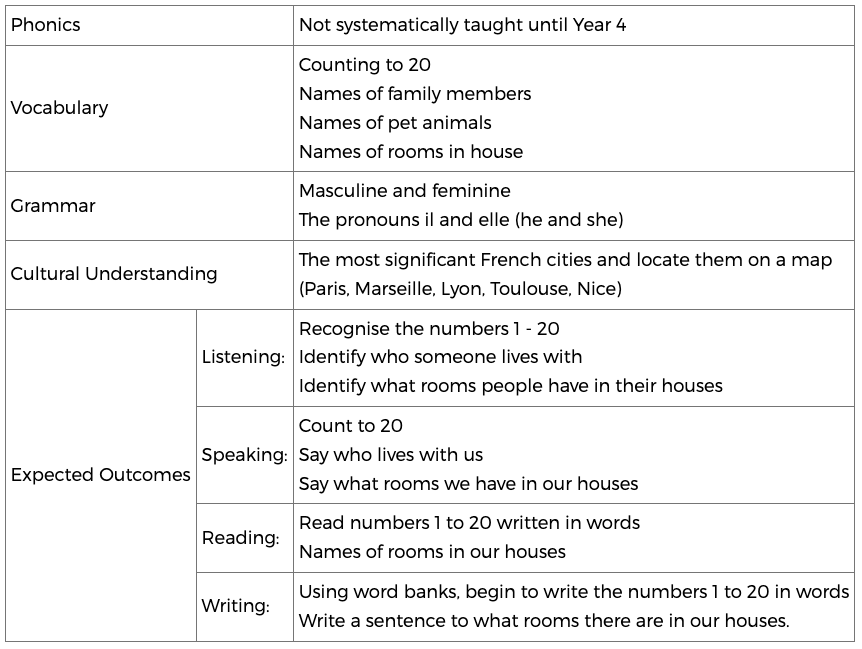
Summer Term 1 - Our School
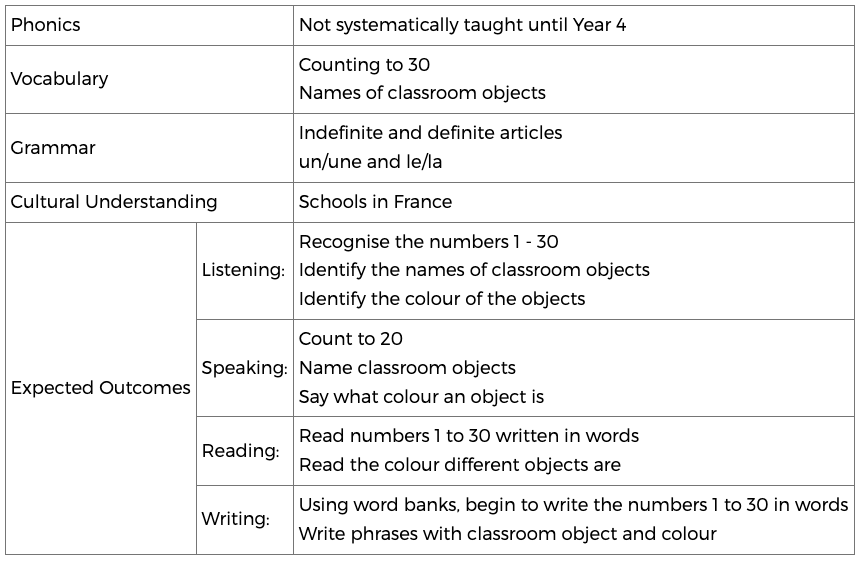
Summer Term 2 - Time
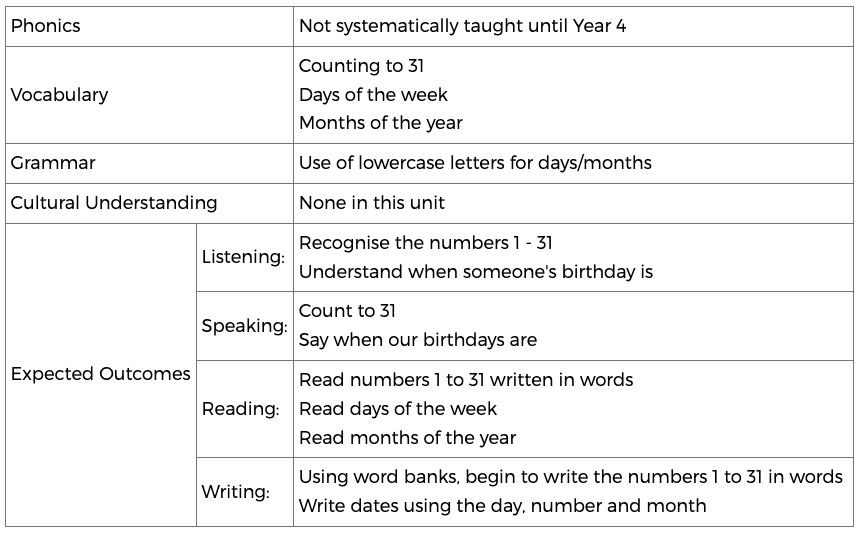
Every lesson contains revision of previous learning.
Year 4
Autumn Term
Phonics (for reading) is introduced in Year 4. This was a new element of the curriculum in 2023-2024, therefore all year groups (4, 5 and 6) are revisiting from the same starting points.
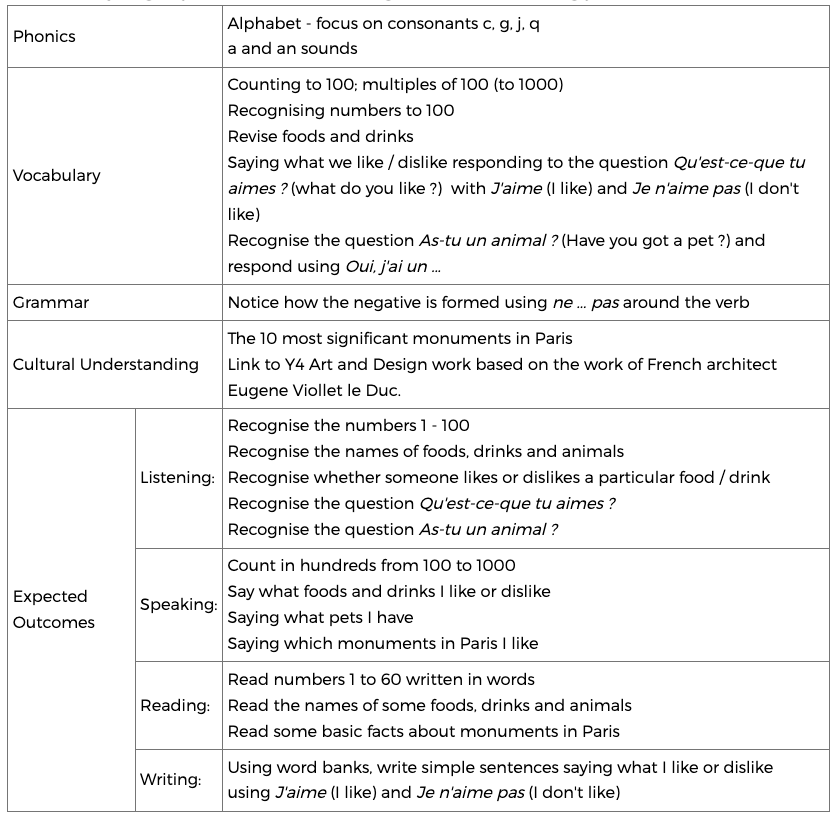
Spring Term - Les passe-temps
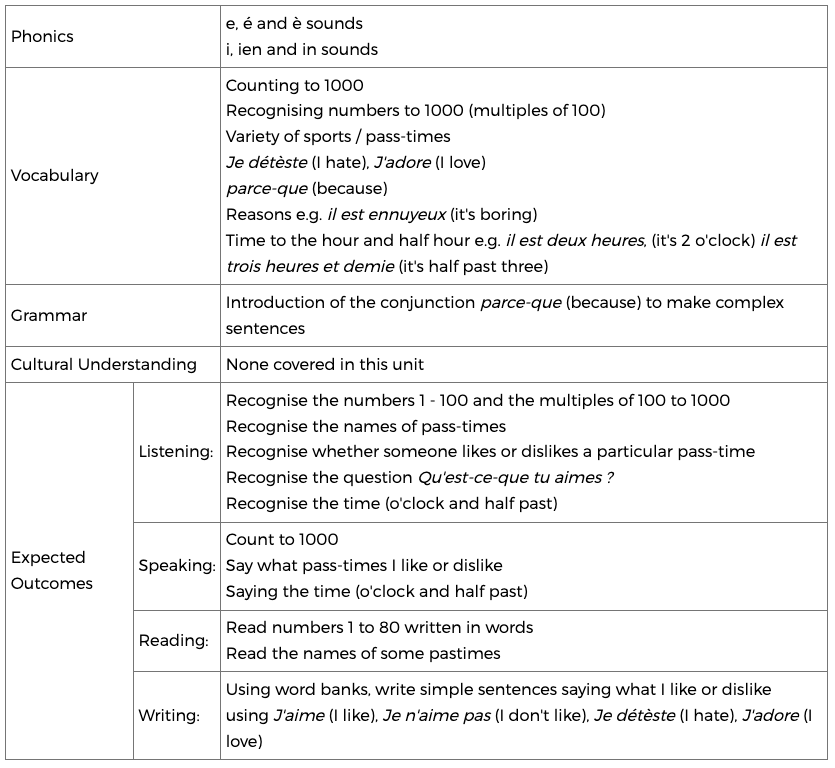
Summer Term - En France
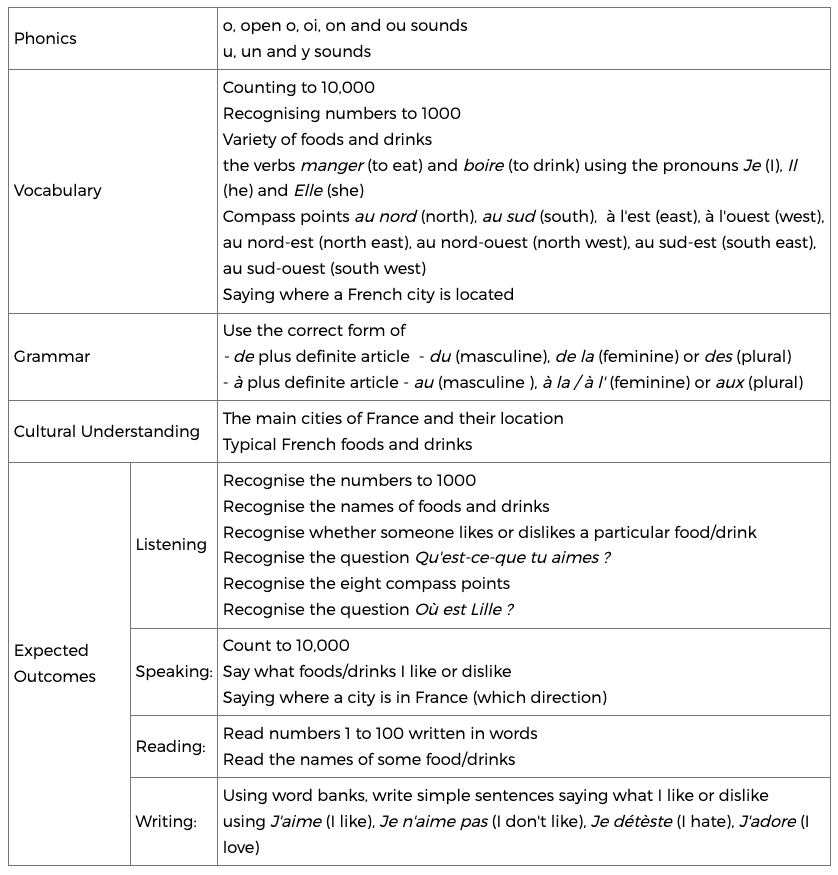
Every lesson contains revision of previous learning.
Year 5
Autumn Term - A l'école (at school)
Phonics (for reading) is introduced in Year 4. This was a new element of the curriculum in 2023-2024, therefore all year groups (4, 5 and 6) are revisiting from the same starting points.
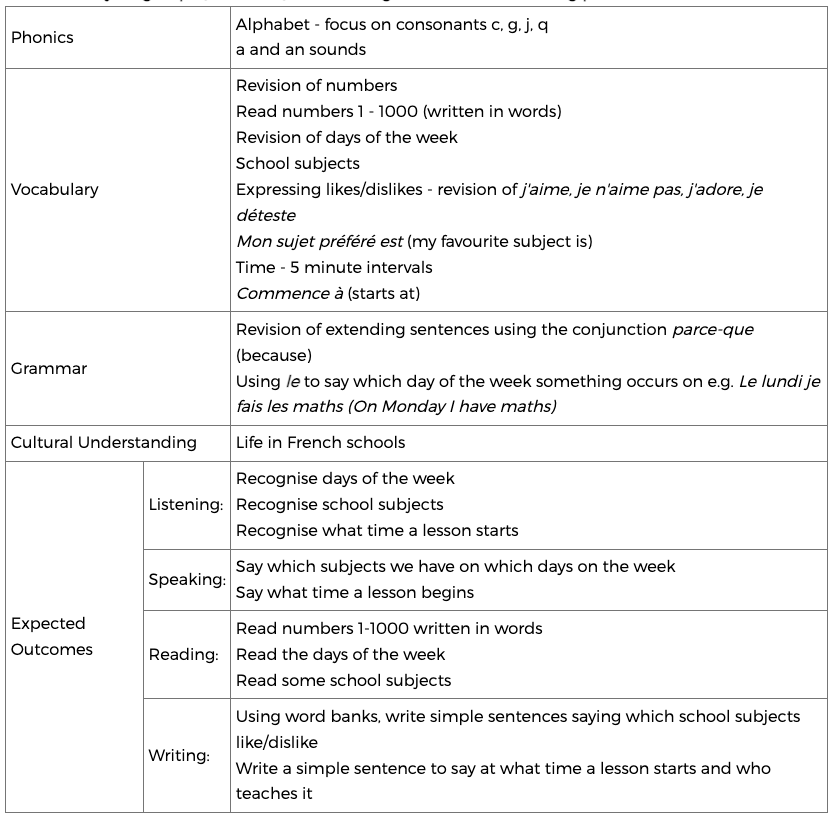
Spring Term 1 - Les Nationalités (nationalities)
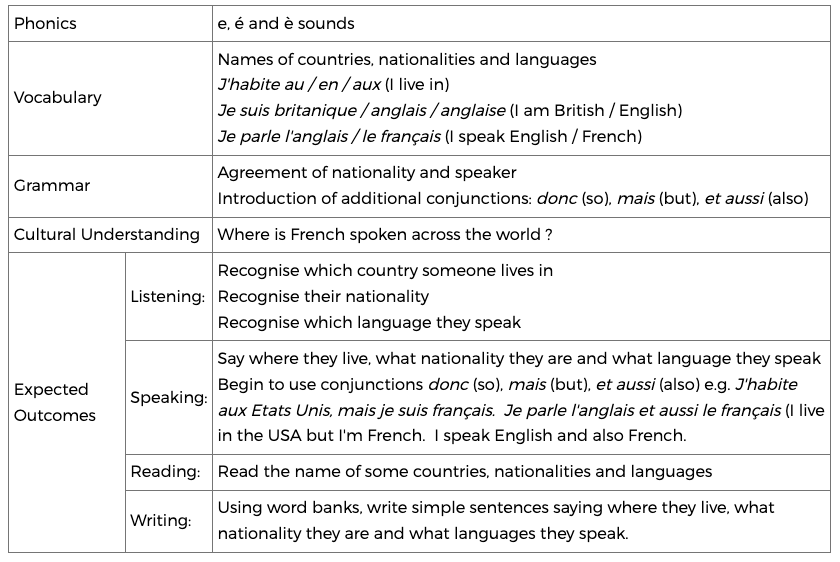
Spring Term 2 - Le cirque (the circus)
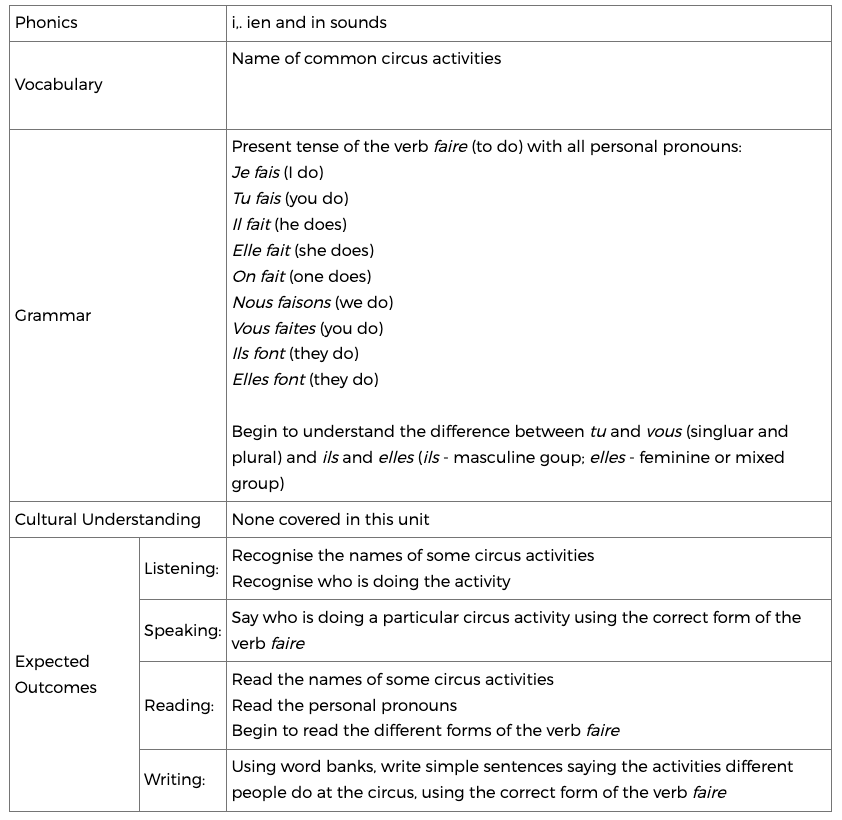
Summer Term - La météo
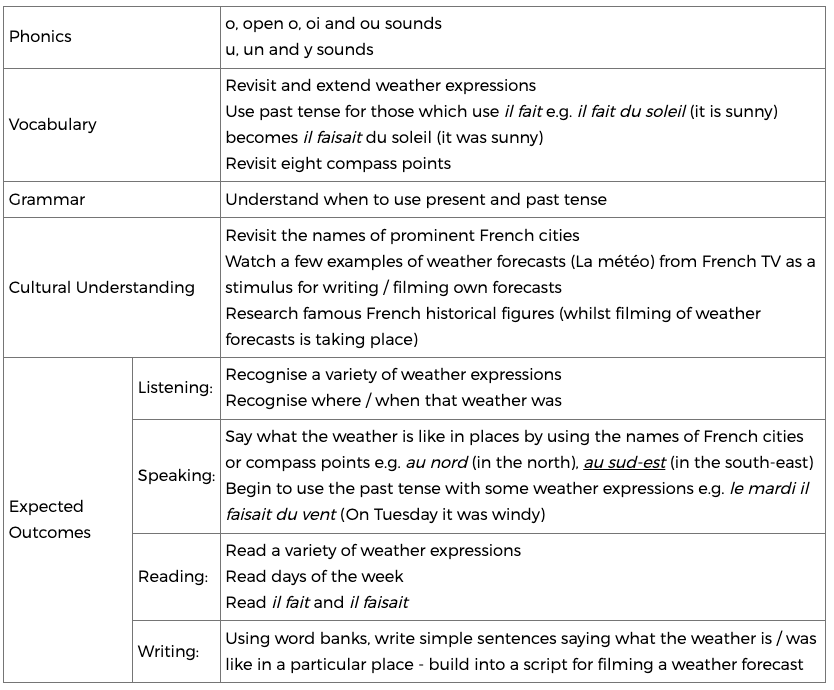
Every lesson contains revision of previous learning.
Year 6
Autumn Term 1 - Time
This was a new element of the curriculum in 2023-2024, therefore all year groups (4, 5 and 6) are revisiting from the same starting points.
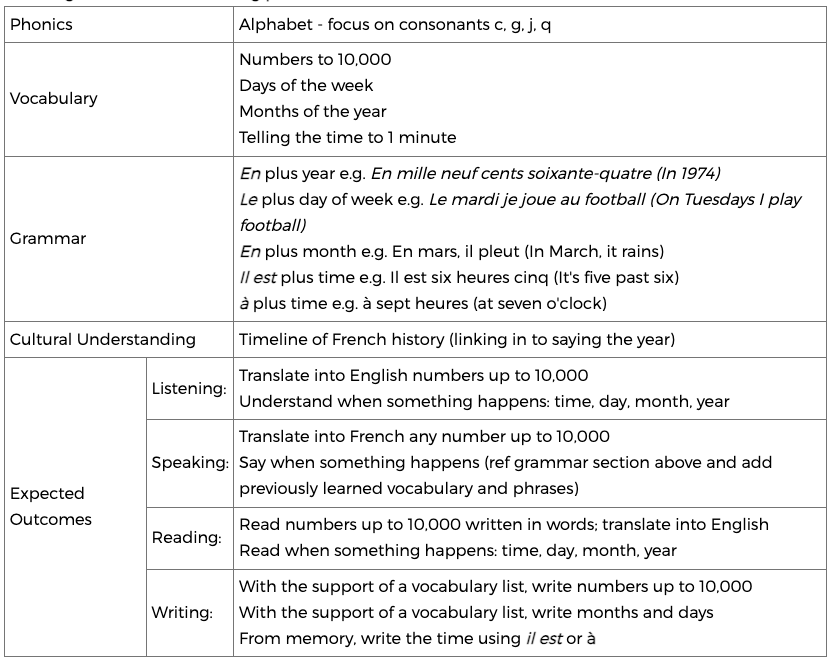
Autumn Term 2 - 'er verbs
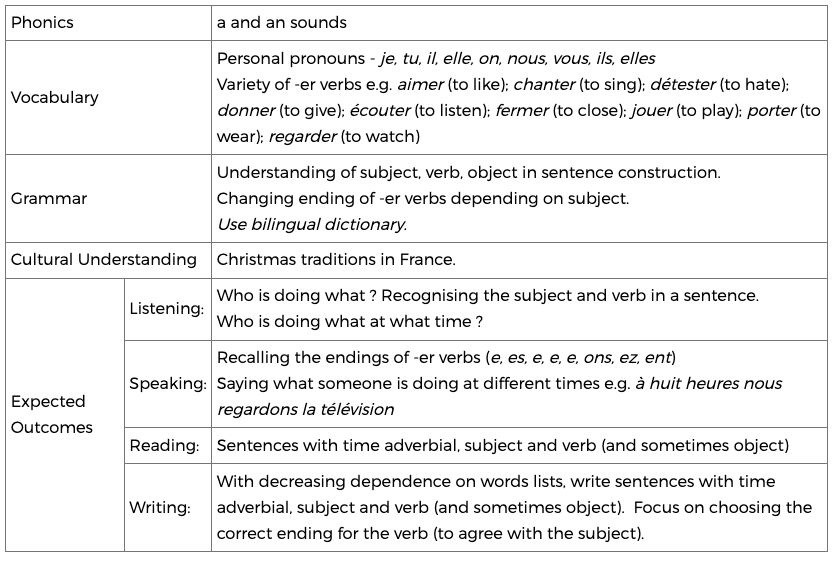
Spring Term 1 - The Four Seasons
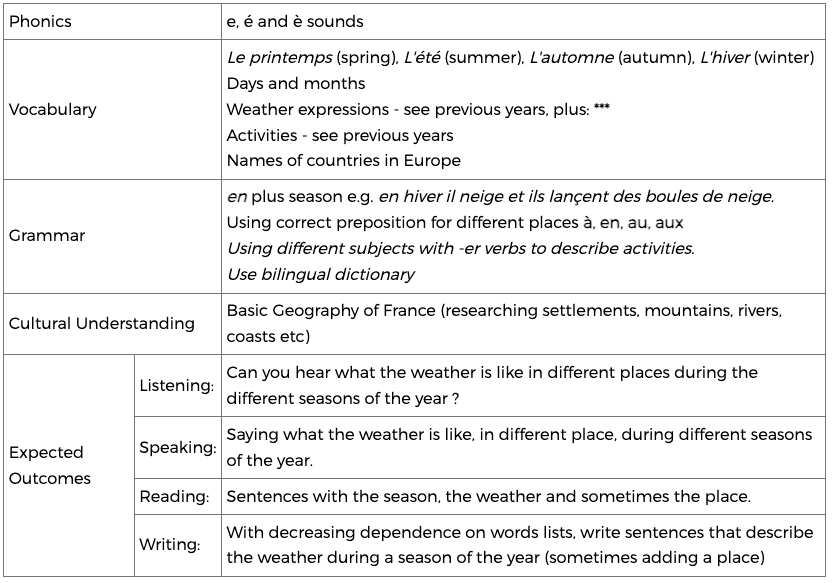
Spring Term 2 - Paris (Ile de France)
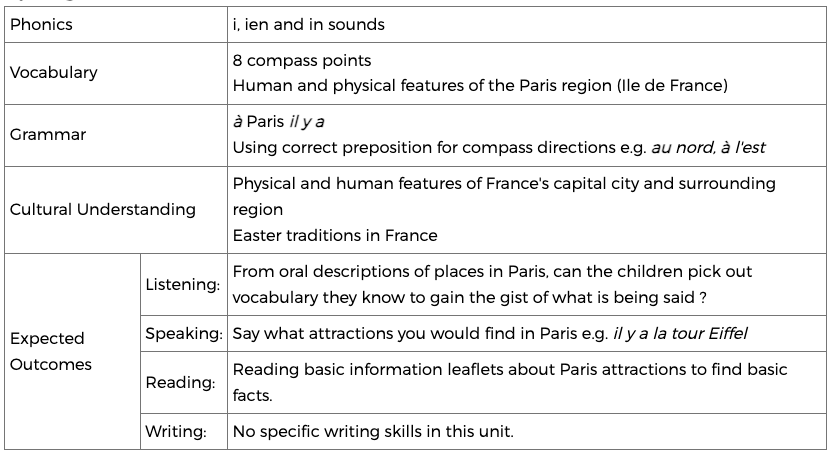
Summer Term 1 - Food and drink
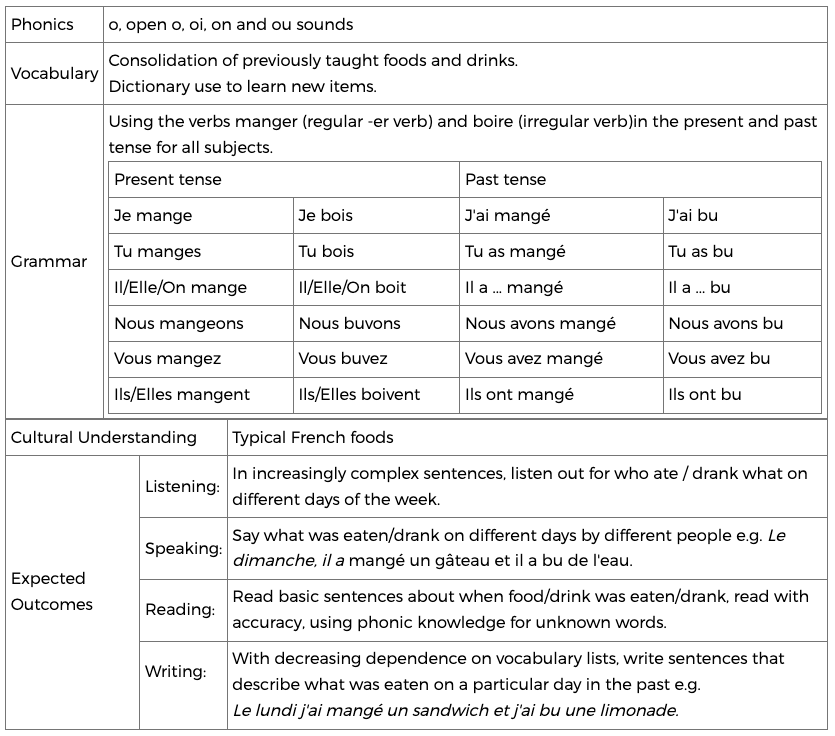
Summer Term 2 - Le Quatorze juillet
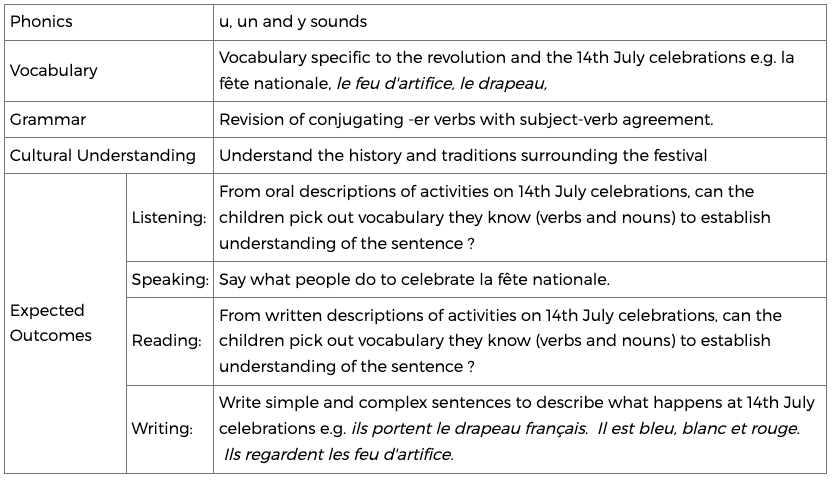
Skills Progression
Phonics
| Autumn 1 | Alphabet focusing on consonants c, q, j, q |
| Autumn 2 | a and an sounds |
| Spring 1 | e, é and è sounds |
| Spring 2 | i, ien and in sounds |
| Summer 1 | o, open o, oi, on and ou sounds |
| Summer 2 | u, un and y sounds |
Numbers
| Counting | Recognising (pick out) | Reading | Writing | |
| Year 3 | 31 | 31 | 1 - 30 | 1-30 |
| Year 4 | 10,000 | 1000 | 1 - 100 | |
| Year 5 | 10,000 | 1 - 1000 | 1 - 20 | |
| Year 6 | 1 - 10,000 | 1 - 100 |
Vocabulary
| Autumn | Spring | Summer | |
| Year 3 |
Greetings Je m'appelle J'ai ** ans Expressions for how we're feeling
Colours Body parts Clothing |
Foods Colours Je voudrais (I would like) J'aime (I like) Je n'aime pas (I don't like)
Famiy members Pets Rooms in house |
Classroom objects Days of week Months of year |
| Year 4 |
Phrases to express likes/dislikes Animals/pets |
Variety of pass-times Phrases to express likes/dislikes Parce-que (because) |
Foods and drinks Manger (to eat) Boire (to drink) Eight compass points |
| Year 5 |
Revision of numbers Days School subjects Phrases to express likes/dislikes Time to 5 minutes |
Names of countries, nationalities and languages How to say where I live, what nationality I am and what languages I speak Donc (so), Mais (but), Et aussi (also)
Common circus activities |
Weather expressions
Eight compass points |
| Year 6 |
Numbers to 10,000 Days and months Time to 1 minute
Personal pronouns Variety of -er verbs |
The four seasons Weather expressions European countries
8 compass points Physical and human features of Paris |
Foods and drinks
Vocab specific to the 14th July celebrations |
Once bilingual dictionaries are introduced in Year 3, they are used regularly so that the children can:
- use pre=prepared vocabulary lists found in the centre of the dictionaries
- generate their own vocabulary lists for a particular topic (using the English to French section)
- translate into English any French words that they read
Verbs
| Year 3 |
Je m'appelle J'ai huit ans J'ai un frère etc J'aime Je n'aime pas |
| Year 4 |
Je détèste, J'adore Il est Je mange, il mange, elle mange Je bois, il bois, elle bois |
| Year 5 |
Present tense of faire - je fais, tu fais, il fait, elle fait, on fait, nous faisons, vous faites, ils font, elles font
Past (imperfect) tense of il fait - il faisait |
| Year 6 |
Present tense of -er verbs e.g. je chante, tu chantes, il chante, elle chante, on chante, nous chantons, vous chantez, ils chantent, elles chantent
Present tense of boire - je bois, tu bois, il boit, elle boit, on boit, nous buvons, vous buvez, ils boivent, elles boivent
Past (perfect) tense of manger and boire using avoir: J'ai mangé, tu as mangé, il a mangé, elle a mangé, on a mangé, nous avons mangé, vous avez mangé, ils ont mangé, ells ont mangé
J'ai bu, tu as bu, il a bu, elle a bu, on a bu, nous avons bu, vous avez bu, ils ont bu, elles ont bu |
Grammar
| Year 3 |
The pronouns je, il and elle Gender un/une le/la Use of apostrophe when a vowel follows je Use of lowercase letters for days/months |
| Year 4 |
Notice how the negative is formed The conjunction parce-que (because) Agreement of à and the definite articles - au, à la or à l', aux |
| Year 5 |
Using Le to say on which day something occurs Agreement of nationality and speaker Introduction of additional conjunctions: donc (so), mais (but) et aussi (also) Present tense of the verb faire using all subjects/personal pronouns Begin to understand the difference between tu and vous; ils and elles Understand when to use present and past tense Past tense of il fait - il faisait |
| Year 6 |
Correct use of prepositions to create time adverbials: En plus the year Le plus day of the week En plus month of year or season Il y a plus time (it is) A plus time (at)
Subject - verb - object : sentence construction Change verb ending depending on subject
Correct use of prepositions to create adverbials of place: En plus feminine country Au plus masculine country Aux plus plural country A plus name of city/village etc A or Au for compass points
Present and past (perfect) tenses of manger (to eat) and boire (to drink) |
Cultural Understanding
| Year 3 |
Where is France ? The most significant French cities and locate them on a map (Paris, Marseille, Lyon, Toulouse, Nice) |
| Year 4 |
The 10 most significant monuments in Paris Link to Y4 Art and Design work based on the work of French architect Eugene Viollet le Duc. The prominent French cities and their location within France Typical French foods and drinks |
| Year 5 |
Life in French schools Where is French spoken across the world ? Revisit prominent French cities Watch a few examples of weather forecasts (La Météo) Research famous French historical figures |
| Year 6 |
Timeline of French history Christmas traditions in France Research basic Geography of France - settlements, mountains, rivers, coasts etc Physical and Human features of Paris Easter traditions in France Typical French foods The history and traditions surround the 14th July |
Geography of France taught through the French Curriculum
To add depth to our French curriculum and to develop the children's cultural understanding as they learn the French language, we cover a number of the KS2 Geography National Curriculum objectives in French lessons:
| Year Group | NC Geography Objective | Topic / Term |
| 3 |
Locational Knowledge locate the world's countries, using maps to focus on Europe, key physical and human characteristics countries and major cities |
"En ville" (Spring term) Learn the names of some of most significant French cities and locate them on a map of France (Paris, Marseille, Lyon, Toulouse, Nice) |
| 4 |
Locational Knowledge locate the world's countries, using maps to focus on Europe, key physical and human characteristics countries and major cities |
"Likes and Dislikes" (Autumn term) Learn about the 10 most significant landmarks in Paris |
| 4 |
Locational Knowledge locate the world's countries, using maps to focus on Europe, key physical and human characteristics countries and major cities
Geographical Skills and Fieldwork use the eight points of the compass to build their knowledge of the wider world |
"En France" (Summer term) Saying where a French city is located using the eight points of the compass (au nord, au sud, à l'est, à l'ouest, au nord-est, au nord-ouest, au sud-est, au sud-ouest) |
| 5 |
Geographical Skills and Fieldwork use the eight points of the compass to build their knowledge of the wider world |
"La météo" (Summer term) Revisit eight points of the compass |
| 6 |
Locational Knowledge locate the world's countries, using maps to focus on Europe, key physical and human characteristics countries and major cities |
"The Four Seasons" (Spring first half) Name of countries of Europe Research task: the basic geography of France - settlements, mountains, rivers, coasts |
| 6 |
Place knowledge understand geographical similarities and differences through the study of human and physical geography of a region in a European country |
"Paris" (Spring second half) Revisit eight points of the compass Human and physical features of the Paris (Ile de France) region |
Listening
Year 3
| Autumn |
Recognise the numbers 1 - 10 Follow simple classroom instructions Identify the colour of clothing Identify parts of the body |
| Spring |
Recognise the numbers 1 - 20 Recognise names of foods Recognise if some likes or dislikes something Recognise the numbers 1 - 20 Identify who someone lives with Identify what rooms people have in their houses |
| Summer |
Recognise the numbers 1 - 30 Identify the names of classroom objects Identify the colour of the objects Recognise the numbers 1 - 31 Understand when someone's birthday is |
Year 4
| Autumn |
Recognise the numbers 1 - 100 Recognise the names of foods, drinks and animals Recognise whether someone likes or dislikes a particular food / drink Recognise the question Qu'est-ce-que tu aimes ? Recognise the question As-tu un animal ? |
| Spring |
Recognise the numbers 1 - 100 and the multiples of 100 to 1000 Recognise the names of pass-times Recognise whether someone likes or dislikes a particular pass-time Recognise the question Qu'est-ce-que tu aimes ? Recognise the time (o'clock and half past) |
| Summer |
Recognise the numbers to 1000 Recognise the names of foods and drinks Recognise whether someone likes or dislikes a particular food/drink Recognise the question Qu'est-ce-que tu aimes ? Recognise the eight compass points Recognise the question Où est Lille ? |
Year 5
| Autumn |
Recognise days of the week Recognise school subjects Recognise what time a lesson starts |
| Spring |
Recognise which country someone lives in Recognise their nationality Recognise which language they speak
Recognise the names of some circus activities Recognise who is doing the activity |
| Summer |
Recognise a variety of weather expressions Recognise where / when that weather w |
Year 6
| Autumn |
Translate into English numbers up to 10,000 Understand when something happens: time, day, month, year Who is doing what ? Recognising the subject and verb in a sentence. Who is doing what at what time ? |
| Spring |
Can you hear what the weather is like in different places during the different seasons of the year ? From oral descriptions of places in Paris, can the children pick out vocabulary they know to gain the gist of what is being said ? |
| Summer |
In increasingly complex sentences, listen out for who ate / drank what on different days of the week. From oral descriptions of activities on 14th July celebrations, can the children pick out vocabulary they know (verbs and nouns) to establish understanding of the sentence ? |
Speaking
Year 3
| Autumn |
Count to 10 Greet each other Say what their name is Say how old they are Say how they are feeling
Count to 10 Name colours Name items of clothing Name part of the body |
| Spring |
Count to 20 Ask for foods Express likes/dislikes
Count to 20 Say who lives with us Say what rooms we have in our houses |
| Summer |
Count to 20 Name classroom objects Say what colour an object is
Count to 31 Say when our birthdays are |
Year 4
| Autumn |
Count in hundreds from 100 to 1000 Say what foods and drinks I like or dislike Saying what pets I have |
| Spring |
Count to 1000 Say what pass-times I like or dislike Saying the time (o'clock and half past) |
| Summer |
Count to 10,000 Say what foods/drinks I like or dislike Saying where a city is in France (which direction) |
Year 5
| Autumn |
Say which subjects we have on which days on the week Say what time a lesson begins |
| Spring |
Say where they live, what nationality they are and what language they speak Begin to use conjunctions donc (so), mais (but), et aussi (also) e.g. J'habite aux Etats Unis, mais je suis français. Je parle l'anglais et aussi le français (I live in the USA but I'm French. I speak English and also French. Say who is doing a particular circus activity using the correct form of the verb faire |
| Summer |
Say what the weather is like in places by using the names of French cities or compass points e.g. au nord (in the north), au sud-est (in the south-east) Begin to use the past tense with some weather expressions e.g. le mardi il faisait du vent (On Tuesday it was windy) |
Year 6
| Autumn |
Translate into French any number up to 10,000 Say when something happens (ref grammar section above and add previously learned vocabulary and phrases) Recalling the endings of -er verbs (e, es, e, e, e, ons, ez, ent) Saying what someone is doing at different times e.g. à huit heures nous regardons la télévision |
| Spring |
Saying what the weather is like, in different place, during different seasons of the year. Say what attractions you would find in Paris e.g. il y a la tour Eiffel |
| Summer |
Say what was eaten/drank on different days by different people e.g. Le dimanche, il a mangé un gâteau et il a bu de l'eau. Say what people do to celebrate la fête nationale. |
Reading
Year 3
| Autumn |
Read numbers 1 to 10 written in words Read colour words Read items of clothing |
| Spring |
Read numbers 1 to 20 written in words Read the names of some foods Names of rooms in our house |
| Summer |
Read numbers 1 to 30 written in words Read the colour different objects are Read days of the week |
Year 4
| Autumn |
Read numbers 1 to 60 written in words Read the names of some foods, drinks and animals |
| Spring |
Read numbers 1 to 80 written in words Read the names of some pastimes |
| Summer |
Read numbers 1 to 100 written in words Read the names of some food/drinks |
Year 5
| Autumn |
Read numbers 1-1000 written in words Read the days of the week Read some school subjects |
| Spring |
Read the name of some countries, nationalities and languages Read the names of some circus activities Read the personal pronouns Begin to read the different forms of the verb faire |
| Summer |
Read a variety of weather expressions Read days of the week Read il fait and il faisait |
Year 6
| Autumn |
Read numbers up to 10,000 written in words; translate into English Read when something happens: time, day, month, year Sentences with time adverbial, subject and verb (and sometimes object) |
| Spring |
Sentences with the season, the weather and sometimes the place. Reading basic information leaflets about Paris attractions to find basic facts. |
| Summer |
Read basic sentences about when food/drink was eaten/drank, read with accuracy, using phonic knowledge for unknown words. From written descriptions of activities on 14th July celebrations, can the children pick out vocabulary they know (verbs and nouns) to establish understanding of the sentence ? |
Writing
Year 3
| Autumn |
Using word banks, begin to write the numbers 1 to 10 in words Create a phrase using an item of clothing and its colour (trying to agree the adjective) |
| Spring |
Using word banks, begin to write the numbers 1 to 20 in words Using word banks, write simple sentences to say which foods they like/dislike Write a sentence to say what rooms there are in our houses |
| Summer |
Using word banks, begin to write the numbers 1 to 30 in words Write phrases with classroom object and colour Write dates using the day, number and month |
Year 4
| Autumn | Using word banks, write simple sentences saying what I like or dislike using J'aime (I like) and Je n'aime pas (I don't like) |
| Spring | Using word banks, write simple sentences saying what I like or dislike using J'aime (I like), Je n'aime pas (I don't like), Je détèste (I hate), J'adore (I love) |
| Summer | Using word banks, write simple sentences saying what I like or dislike using J'aime (I like), Je n'aime pas (I don't like), Je détèste (I hate), J'adore (I love) |
Year 5
| Autumn |
Using word banks, write simple sentences saying which school subjects like/dislike Write a simple sentence to say at what time a lesson starts and who teaches it. |
| Spring |
Using word banks, write simple sentences saying where they live, what nationality they are and what languages they speak. Using word banks, write simple sentences saying the activities different people do at the circus, using the correct form of the verb faire |
| Summer | Using word banks, write simple sentences saying what the weather is / was like in a particular place - build into a script for filming a weather forecast |
Year 6
| Autumn |
With the support of a vocabulary list, write numbers up to 10,000 With the support of a vocabulary list, write months and days From memory, write the time using il est or à With decreasing dependence on words lists, write sentences with time adverbial, subject and verb (and sometimes object). Focus on choosing the correct ending for the verb (to agree with the subject). |
| Spring | With decreasing dependence on words lists, write sentences that describe the weather during a season of the year (sometimes adding a place) |
| Summer |
With decreasing dependence on vocabulary lists, write sentences that describe what was eaten on a particular day in the past e.g. Le lundi j'ai mangé un sandwich et j'ai bu une limonade. Write simple and complex sentences to describe what happens at 14th July celebrations e.g. ils portent le drapeau français. Il est bleu, blanc et rouge. Ils regardent le feu d'artifice. |




